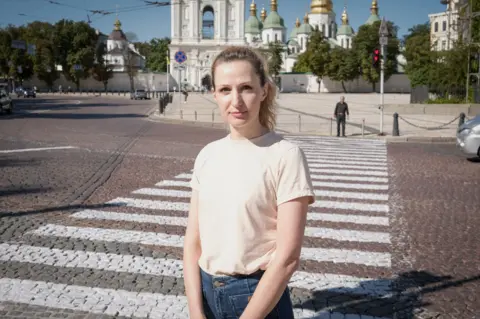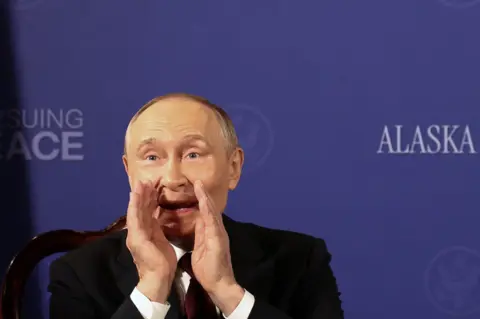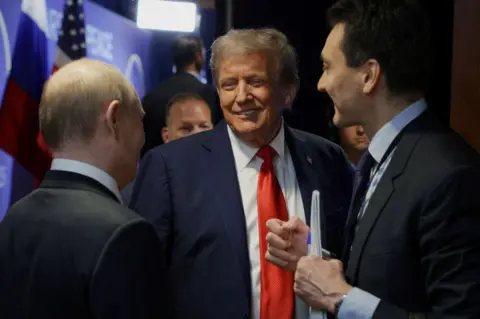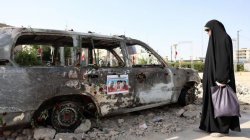
 EPA
EPAUkrainians went to bed on Friday night with the frightening possibility that Donald Trump could be seduced by Vladimir Putin into offering significant concessions on the war.
They woke up on Saturday morning to find that the Trump-Putin summit in Alaska instead had fizzled out without any strategic or political agreements. It was a rare example of a failed summit coming as a relief.
In the absence of any real developments, attention in Ukraine turned to the presentational aspects of the summit – the "optics", in political speak.
Putin, the man responsible for the devastating war of aggression against Ukraine, had received the warmest welcome possible in Alaska. American soldiers knelt to literally roll out the red carpet for him. Trump applauded him as he approached and offered a friendly handshake. The two leaders rode together alone in Trump's presidential limousine and Putin could be seen laughing as the car pulled away.
For the Russian president, who has been shunned internationally since his full-scale invasion of Ukraine, the greeting marked the beginning of a remarkable return to the global diplomatic stage and set a tone that would continue throughout the day.
In Ukraine, it was not a welcome sight.
"Red carpets and this level of ceremony are normal at international events, but in this case – for an aggressor responsible for the deaths of millions – it should not have happened," said Maria Drachova, 40, a lawyer in the capital Kyiv.
Drachova, who woke up and watched the footage over breakfast, said it appeared as though "the entire event was staged to please Putin".
"The rational world is behaving irrationally by giving him this welcome," she said.

Putin's plane had been escorted into the airbase in Alaska by four American fighter jets and as he strolled down the red carpet, talking jovially with Trump, an American B-2 bomber flew overhead flanked by four more jets.
Ukrainians who had stayed up late to watch the spectacle were seeing the "legitimisation of a war criminal at the highest level", said Oleksandr Kovalenko, a Ukrainian writer and political analyst.
"There was no need for this pomp at all," Kovalenko said. "This is a meeting that should have been conducted in a much more restrained way – minimalistic, without this level of respect."
After the greetings, Trump and Putin sat down in front of a gaggle of reporters at Elmendorf Air Force Base, under a banner that read "Pursuing Peace". A question was shouted at Putin: "Will you you stop killing civilians?"
The Russian leader appeared to smirk, and gestured to his ear to suggest he couldn't hear.
Along with the smiles, laughter, and general good will on show, the gesture struck a very sour note in Ukraine, where hundreds of thousands have been killed and wounded in Russia's war of aggression.
"When I saw what happened I felt crushed," said Serhii Orlyk, 50, from the eastern province of Donetsk, which has been largely seized by Russian forces and seen some of the most intense fighting of the war.
"I lost my home twice, in Sloviansk and in Donetsk. I lost relatives," Orlyk said. "I understand that to agree on something, there must be protocol, you cannot just slap Putin in the face when he arrives. But it was a very unpleasant spectacle – especially his smirks."
 Getty Images
Getty ImagesThe deference to Putin continued after the negotiations. In a joint statement to the press, Trump gave way to the Russian leader to speak first. He spoke for about eight minutes, carefully avoiding any mention of how the war began – with a striking and unprovoked act by Russia.
Putin appeared energetic, satisfied by how the summit had gone. Trump, by contrast, appeared uncharacteristically deflated, and spoke for barely two minutes. He could not boast of anything approaching a deal – the currency by which he tends to operate.
Instead, he had handed the initiative to Putin, said Kier Giles, a senior fellow in the Russia and Eurasia program at Chatham House.
"It was a massive victory for Putin even before he got off the plane, to be rehabilitated in this manner," Giles said. "Trump has facilitated him arriving to be greeted as a head of state, when he ought to be finding it difficult to travel because he is an internationally wanted war criminal."
 Reuters
ReutersTrump's approach would be unlikely to inspire European leaders to follow suit, Giles said. "If anything, it will reinforce how important it is not to endorse Putin's demands on Ukraine, and not to subject themselves to the same kinds of spectacle that is earning Trump scorn."
In a statement on Saturday, President Zelensky stressed the importance of European leaders being present at every stage of the negotiations. They are often seen as a bulwark against the possibility of Trump being unduly influenced by Putin.
But before that happens, Zelensky will head on Monday back to Washington, the scene of his disastrous Oval Office clash with Trump back in February. He will be hoping for a better outcome this time, and a path to peace that doesn't involve surrendering to Russia's aggressive demands.
The US had a "wide range of tools" at its disposal to assist Ukraine in that mission, said Oleksandr Kovalenko, the political analyst. But pomp and ceremony for President Putin should not be among them, he said.
"Perhaps this was all intended to deceive and flatter Putin, and push him into following the White House's strategy," Kovalenko said.
"But I doubt it. More likely it is Trump's whim, without any strategy at all."
Additional reporting by Daria Mitiuk

21 PerFlyer